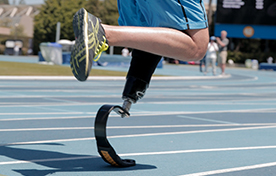Choosing a Prosthetist
– by Wendy Beattie, CPO, FAAOP
Choosing a prosthetist is an important decision for those facing an amputation, for those who have a family member with limb differences, and, sometimes, even for those who have worn prostheses for years.
Each person’s needs and preferences are unique. Your physician and therapist may be able to recommend a prosthetist – but remember the choice is ultimately yours. Ask why they are recommending the person and if they have other suggestions. You will be looking at the qualifications of both the prosthetist and the company where he or she works. The prosthetist should be a knowledgeable, reliable professional; the company is important for logistics and insurance coverage.
Proximity to your home can be critical. A prosthesis is a custom-made device that will require several visits for a proper fit and numerous follow-up visits to maintain a good fit. If the prosthetist is too far away, it may discourage you from keeping appointments, so it’s important to choose someone at a convenient location.
Make certain the company and facility are reputable. How long have they been in business? Are the facilities clean and accessible? Do they have a program for addressing complaints or problems? Do they accept your insurance? Some insurance companies require prior authorization; will the company take care of this, or is this your responsibility? How much out-of-pocket expense will you have to incur? Are there any options for payment plans? Is there someone available to help you in an emergency? You may wish to talk to someone with a similar situation as yours – an individual of about the same age and amputation level who enjoys the same activities. If you are unfamiliar with anyone in your situation, does the company know of such a person? The Amputee Coalition can provide you with a listing of support groups in your area.
Having a prosthesis made for you requires time, patience and communication. While choosing a surgeon may entail finding someone with the necessary skills and the ability to communicate with you, choosing a prosthetist will require different criteria. An easy and comfortable rapport is imperative, since this is someone with whom you will most likely develop a long relationship. No matter how talented a practitioner, he or she cannot feel inside the prosthesis or know your life style, your living situations, your hobbies and your goals. If the person you are referred to does not fabricate what you need, perhaps he or she can put you in contact with the right person.
Once you have found a prosthetist who fits your needs, the two of you share the responsibility to make your prosthesis fit and function optimally. Will the prosthetist discuss options with you and guide you toward a decision? Does the prosthetist tell you what is best for you? Can you try different things before making a final choice?
You will have your own set of priorities. Do you want to run? Is the cosmetic finish of the prosthesis your primary concern? Can the limb be put on and taken off quickly and easily? Make these priorities known at one of the initial visits. This diminishes the chances for misunderstandings and disappointment.
Continuity of care is important. It may take time to reach your goals. It is best for the prosthetist who designed and fit the prosthesis to follow up and make whatever adjustments are necessary. If you feel your prosthesis or your fit with your prosthetist is not the best, shop around. The time to look for a new prosthetist is not when you are in dire need of a new limb, but when you have time to make an informed decision.
For more information on choosing a prosthetist contact the Amputee Coalition toll-free at 1-888/267-5669.
About the Author:
Wendy Beattie, FAAOP, CPO, is a certified prosthetist with Becker Orthopedic in Waterford, Michigan. She currently serves on the board of directors of the American Academy of Orthotists and Prosthetists (AAOP), is on the editorial board of “The Journal of Orthotics and Prosthetics,” and is the executive director of Special Opportunities for Amputee Rehabilitation (SOAR).
Disclaimer: The following information is provided and owned by the Amputation Coalition of America and was previously published on the website http://www.amputee-coalition.org or the Coalitions Newsletter, inMotion.








